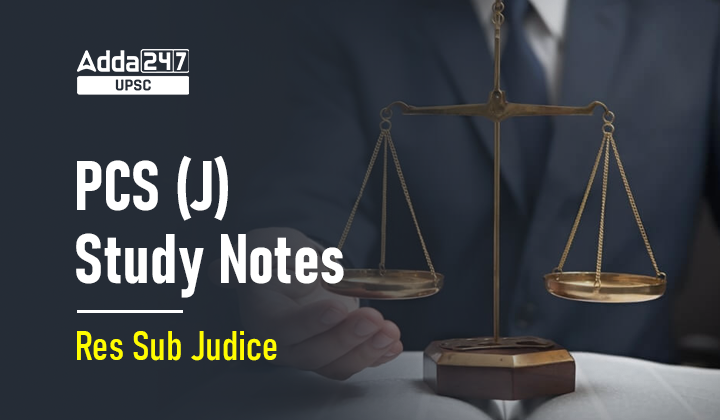Table of Contents
Meaning of Res Sub Judice
The phrase Res Sub judice is Latin maxim which means the “under judgment”. To avoid having two conflicting court rulings on the same matter, the rule of sub judice bans a plaintiff from filing two separate cases on the same subject. The goal of the doctrine of Res Sub judice is to prevent a complexity of the proceedings and to refrain two conflicting decisions. The doctrine forbids a second trial on the same issue while the first one is still ongoing. However, it doesn’t limit your options for completing the next suit.
According to Section 10 of the CPC, no court shall institute the trial of any suit if the issues are the same as, or closely linked to, a suit already instituted between the same parties or parties litigating on their behalf under the same title and the matter is pending before the court having the competent jurisdiction in the territory of India or any court beyond the borders of India created by central governments with the same jurisdiction or before the supreme court of India. If two or more similar cases are filed in the same court, the competent court has the authority under Section 10 to halt the proceedings in the other court. In cases where the same cause of action exists between the same parties over the same subject matter, the trial of parallel litigation is barred under Section 10. We included this provision in the CPC so that the offender would not be punished twice for the same act.
Conditions of Res sub-judice
This section can only be applied if the following condition are satisfied. These are:
- Two suits – Previously Instituted and Subsequently Instituted.
- Matter in issue in subsequent suit – directly and substantially in issue in previous suit.
- Both suits between same parties or their representatives.
- Previous suit must be pending in same or in any other court.
- The court dealing with previously instituted suit competent to grant relief claimed in subsequent suit
- Parties litigating under the same titles in both the suit.
रेस सब-ज्यूडिस का अर्थ
रेस सब-ज्यूडिस वाक्यांश लैटिन मैक्सिम है जिसका अर्थ है “निर्णय के तहत”। एक ही मामले पर दो परस्पर विरोधी अदालती फैसलों से बचने के लिए, विचाराधीन नियम एक वादी को एक ही विषय पर दो अलग-अलग मामले दर्ज करने से रोकता है। रेस सब-ज्यूडिस के सिद्धांत का लक्ष्य कार्यवाही की जटिलता को रोकना और दो परस्पर विरोधी निर्णयों से बचना है। सिद्धांत एक ही मुद्दे पर दूसरे परीक्षण की मनाही करता है जबकि पहला अभी भी चल रहा है। हालांकि, यह अगले सूट को पूरा करने के लिए आपके विकल्पों को सीमित नहीं करता है।
सीपीसी की धारा 10 के अनुसार, कोई भी अदालत किसी भी मुकदमे की सुनवाई शुरू नहीं करेगी यदि मुद्दे समान हैं, या निकटता से जुड़े हुए हैं, एक ही पक्ष या पार्टियों के बीच पहले से ही एक ही शीर्षक के तहत मुकदमेबाजी कर रहे हैं और मामला भारत के क्षेत्र में सक्षम क्षेत्राधिकार वाले न्यायालय या भारत की सीमाओं से परे किसी भी न्यायालय में समान अधिकार क्षेत्र वाली केंद्र सरकारों द्वारा या भारत के सर्वोच्च न्यायालय के समक्ष लंबित है। यदि एक ही अदालत में दो या अधिक समान मामले दायर किए जाते हैं, तो सक्षम अदालत को धारा 10 के तहत अन्य अदालत में कार्यवाही को रोकने का अधिकार है। उन मामलों में जहां एक ही विषय पर एक ही पक्ष के बीच कार्रवाई का एक ही कारण मौजूद है, समानांतर मुकदमेबाजी का परीक्षण धारा 10 के तहत वर्जित है। हमने इस प्रावधान को सीपीसी में शामिल किया ताकि अपराधी को एक ही कार्य के लिए दो बार दंडित न किया जा सके। .
रेस के सब-ज्यूडिस की शर्तें
यह धारा तभी लागू की जा सकती है जब निम्नलिखित शर्ते पूरी हों। य़े हैं:
- दो सूट – पहले स्थापित और बाद में स्थापित।
- बाद के वाद में विचाराधीन मामला – पिछले वाद में सीधे और पर्याप्त रूप से जारी किया गया मामला।
- दोनों एक ही पक्ष या उनके प्रतिनिधियों के बीच सूट करते हैं।
- पिछला मुकदमा उसी या किसी अन्य अदालत में लंबित होना चाहिए।
- पूर्व में स्थापित वाद से निपटने वाला न्यायालय बाद के वाद में दावा की गई राहत प्रदान करने के लिए सक्षम है
- दोनों वादों में एक ही शीर्षक के तहत मुकदमा चलाने वाले पक्ष।



 TSPSC Group 1 Question Paper 2024, Downl...
TSPSC Group 1 Question Paper 2024, Downl...
 TSPSC Group 1 Answer key 2024 Out, Downl...
TSPSC Group 1 Answer key 2024 Out, Downl...
 UPSC Prelims 2024 Question Paper, Downlo...
UPSC Prelims 2024 Question Paper, Downlo...






